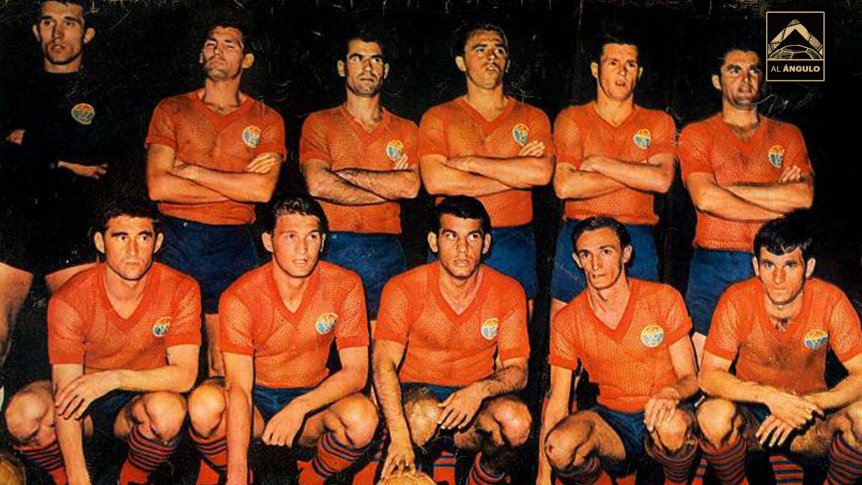In 1968, Hungary’s communist poster boys thought playing Argentina’s world champions in their rabidly anti-communist backyard was a good idea. It was.

By Daniel Cochran
Budapest’s Vasas SC made quite a reputation for themselves as world travellers in the middle of the 20th Century. From putting seven goals past Spurs at White Hart Lane in 1955 to meeting Picasso (and allegedly destroying thousands of pounds worth of artworks) in France in ’61. In contrast to today’s second division languishers, back in the day there was never a dull moment on the road for the three-time Hungarian champions.
These trips, usually for friendlies or mini-tournaments, often had an ideological bent. Following Hungary’s twin trouncings of England in 1953 and 54, it made sense to send strong Hungarian clubs abroad to hammer home their superiority (and by extension the primacy of communist sport as a whole). Vasas were – like so many other sportspeople of the era – pawns in a global game. When they won abroad it was a victory for the communist regime – and they won a lot.
The summer tournaments (known as the Torneos de Verano) in the coastal city of Mar del Plata are now a prestigious fixture in the Argentinian footballing calendar, and even in their early days they attracted strong competition.
Argentina’s Racing Club had just come off a bruising 3-legged Intercontinental Cup final with Celtic to be crowned the best club in the world. The final match – played in Uruguay – was so violent it was dubbed The Battle of Montevideo and featured 6 red cards. Legendary Celtic manager Jock Stein had told reporters that the Glaswegians wanted to win, “not so much for ourselves but to prevent Racing from becoming champions”. They couldn’t – Racing snuck it 1-0.
As well as Racing, the 1968 Torneo de Verano also featured fellow Argentinians River Plate and even a national selection from Czechoslovakia: a byproduct of the Prague Spring liberalizations.

To fill out the brackets, Hungary’s government made the strange choice to allow Vasas to visit Argentina; a country then led by the rabidly anti-communist dictator Juan Carlos Onganía who’d taken power in a coup d’état two years earlier. Vasas were already in South America for a mid-season tournament in Chile, and special visas were arranged, presumably in the hope that the Argentine teams would send those troublesome communists home with their khvosty between their legs.

Vasas were naively – but perhaps understandably – unfancied by an Argentine press bullish about their local teams’ chances. Despite their successful European forays, Vasas were practically unknown in South America and were viewed as makeweights. The local consensus was that Angyalföld boys would provide a propaganda boost to Onganía’s regime in their inevitable defeat.

It didn’t work out that way, and it’s not really surprising why. Vasas – led by the great János Farkas (who’d not only won Olympic gold with Hungary in ’64, but also scored a wondergoal that helped them beat Brazil in the 1966 World Cup) – were simply too disciplined and tactically astute for their Argentine opponents. They beat world champions Racing 3-1 in the semi-final – despite going behind early – with goals by Radics, Mencsek and Korsós doing the damage.
The final against River Plate was a sell-out despite Racing‘s elimination, but Vasas were confident. The team even spent the afternoon before the match sightseeing in Mar del Plata. Once on the pitch the Hungarians dealt out an even more comprehensive drubbing of their Argentine opponents, winning 3-0 (another 2 from Mencsek and a coup de grâce from Farkas). As was customary of a 1960s South American-European battle (especially one loaded with ideological weight), each team had a player sent off.
Although Vasas only managed to finish 3rd in the Hungarian league that year (despite 19 goals from Farkas), it’s not often you demolish the world champs in their own backyard.
Selected Sources:
De película: la historia del equipo húngaro que llegó como colado a Mar del Plata y deslumbró en el primer torneo de verano. La Nación, Alfredo Ves Losada
Copa Mar del Plata 1968. RSSSF
Vasas de Budapest: la increíble historia del primer campeón de verano. TYC Sports, Marisa Pontieri
